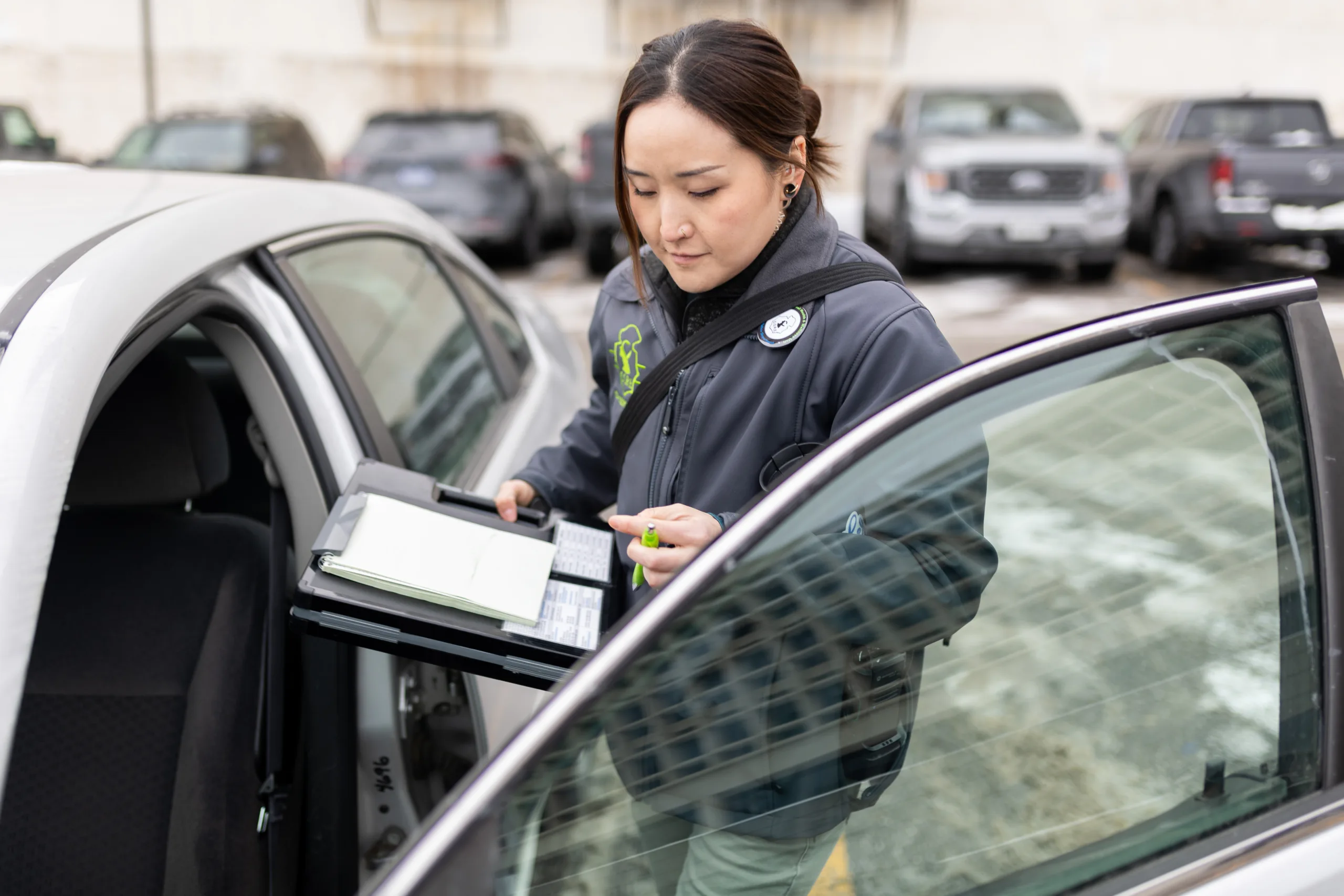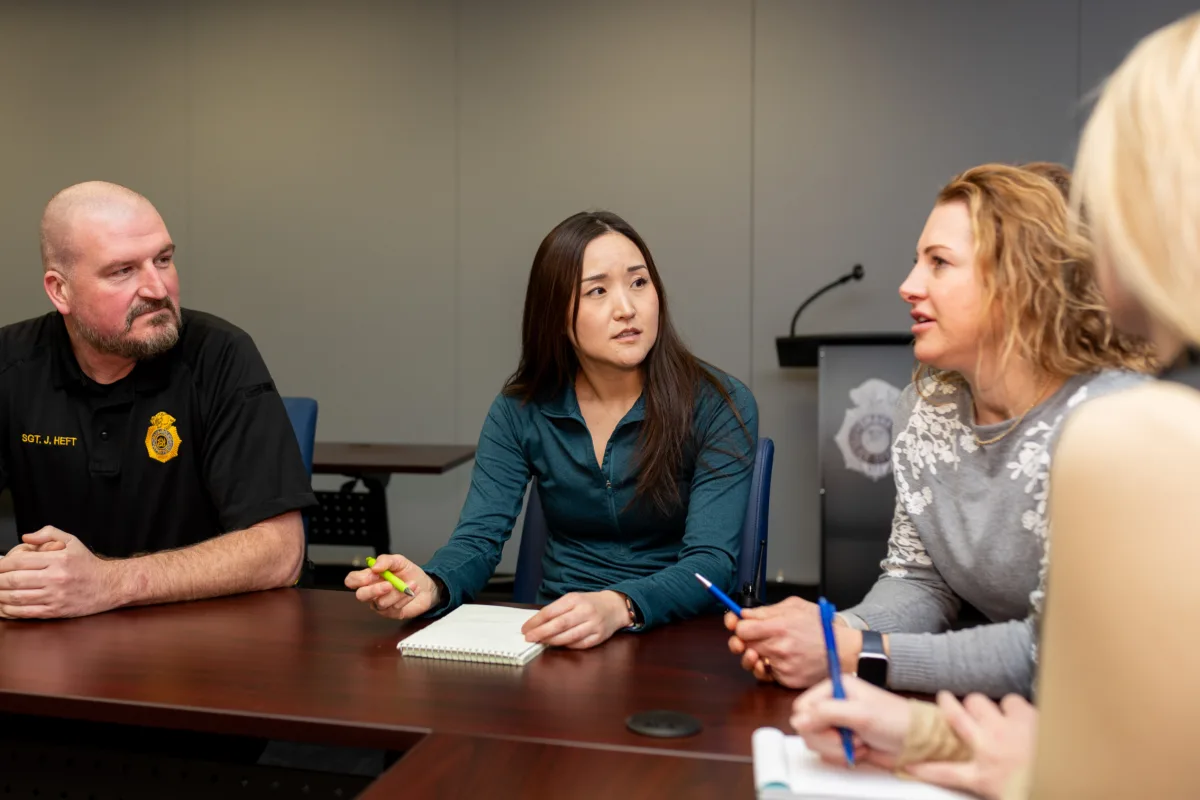Calling for Frank: Little-Known Police Unit Helps Omahans in Crisis–Including Me
A small unit inside the Omaha Police Department helps to handle the deluge of mental health crises that police grapple with daily.

This story was originally published by Flatwater Free Press, an independent nonprofit newsroom based in Omaha, Nebraska.
Natalya Flaten heard the officer ask for the “Frank Unit” on police radio on a recent winter morning.
Rising behind her desk nestled among sergeants in the Omaha Southwest Precinct office, Flaten put on a bulletproof vest, grabbed her case brimming with program pamphlets and climbed in a city vehicle, driving to meet with police officers on scene.
Once she arrived, she met the caller: A woman, curled up in a ball, sobbing and slurring her words.
No one knew what was wrong.
It’s Flaten’s job–a relatively new job, called a “co-responder”–to help the police department navigate the tidal wave of mental health needs they encounter daily.
It’s her job to help victims of crime through the aftermath of that traumatic event–as Flaten did for me personally when I became one of those survivors in 2022. It’s also her job to help unravel potential mental health mysteries like the sobbing, confused woman.
The woman had gone to the emergency room the night before, only to be told she was fine and should go home.
She called 911. She started throwing up. Police officers thought she might be drunk, but to Flaten, something else seemed off.
Flaten took the woman back to the ER. Upon arriving, a hospital employee asked Flaten, “You got another psych patient?”
No, Flaten said, but you should check her again. Her symptoms seem consistent with a head injury.
Later, Flaten received a text from the caller: “I have a concussion!”
Recounting the story, Flaten briefly considers what would happen if co-responders like her didn’t exist.
“If she had just been left to wonder what was happening, it would have been miserable,” Flaten said.
At each Omaha police precinct, one or two mental health co-responders get called or self-dispatch to 911 calls alongside law enforcement. They are mental health professionals embedded with the department and known to their sworn colleagues as the therapists from the Frank Unit.
Flaten’s encounter with the woman was one of the 1,322 in-person interactions these six co-responders made with Omahans in a potential mental health crisis in 2023.
Roughly a third of 911 calls routed to the Omaha Police Department are now related to mental health, said Sgt. Jason Heft, who co-leads the behavioral health and wellness unit, which includes mental health co-responders.
That number has more than doubled in the past three years – jumping to 10,307 calls in 2023 – partly because officers and dispatchers are becoming more aware of the mental health needs behind the calls.

A police officer might be dealing with a traffic accident, a civil disturbance or a shoplifting call. And 911 is often the number that springs to mind for a person in a crisis since it guarantees a response, said Lindsay Kroll, the Omaha Police Department’s mental health coordinator.
It takes someone with the expertise and patience to understand what’s happening below the surface, Heft thinks, to diagnose the underlying issue.
In a given week, a co-responder might accompany a homeless person to a shelter, assess whether an Omahan needs a mental health evaluation, follow up with contacts who struggle with mental illnesses, console several victims of crime, talk a suicidal person out of an attempt–and rush to the scene of a suicide to console grieving family members.
Much of this work takes buy-in from police agencies willing to embrace the co-responder approach, said David Harris, a University of Pittsburgh law professor who co-chairs that university’s co-responder operation. It makes sense because police officers aren’t always suited to respond to mental health crises, both experts and police officers themselves say.
The idea of sending mental health professionals out on calls is far from new. Among the famed forerunners: CAHOOTS, started in 1989 in Eugene, Oregon, which deploys a medic and mental health specialist to lower-risk calls.
Since George Floyd’s 2020 murder, more law enforcement agencies have started in-house co-responder programs as communities demand a non-violent approach to de-escalating mental health crises.
“It’s a long time coming,” Harris said.
Both the Omaha Police Department and city leaders say they see the co-responder program’s value.
Jose Falcon, an OPD patrol officer, notices it when an Omahan refusing to talk to police opens up to the co-responder. Heft says the program saves millions of dollars by diverting people from unnecessary arrests, jail time, hospitalization and fines.
Brad Negrete, assistant vice president of health and wellness services at Lutheran Family Services, manages the co-responder programs in Kearney, Grand Island and Fremont, and runs a mobile crisis response team that partners with OPD to provide additional help when co-responders are busy.
Negrete’s sister drove into the Missouri River with her three young children 24 years ago. He believes those four lives could have been saved if there had been co-responders.
“We didn’t know who to call … I think having the services that we have now would have greatly impacted our family,” he said.
The Omaha co-responder program first existed as a pilot project through Lutheran Family Services. Then, starting in 2020, it became a part of the police department itself, one initially funded by philanthropy. This year, for the first time, Omaha started funding co-responder positions out of the city’s general fund.
“The co-responders support the citizens who call 911 in crisis. Their needs can often be better addressed with the support of a co-responder than a law enforcement officer,” said Mayor Jean Stothert in an email statement. Police “Chief (Todd) Schmaderer and I are committed to the funding we need to support the behavioral health unit …”
Co-responders also help police officers themselves, Kroll and Flaten said, providing support to officers suffering from burnout and post-traumatic stress. They have also trained officers on crisis intervention. More than 370 Omaha police officers–close to half of sworn officers–have gone through the 40-hour program.
Roughly 200 times a month, the work of the mental health co-responders affects an Omahan’s life.
And, in June 2022, it touched mine.
Having a mental health professional to lean on when you need it most can be life-changing. That’s what I felt after calling Flaten, who pulled me out of what seemed like desperation.
Earlier that day, while running errands in midtown Omaha, I said yes to a teenager who asked for a ride to a gas station. After I pulled over, he told me to get out of my car and give him my key. I tried to run away. He caught me and threw me to the ground in front of the gas station. He bit my fingers as he tried to wrest my car keys from my hands. Bystanders called the police, who quickly caught him and asked me to identify the teenager.
I learned from an officer at the scene that the teen had been involved in the juvenile justice system. Now, the officer said, he would be responsible for his behavior. My heart sank. I report on the criminal justice system and know the daunting challenges many juvenile justice-involved kids face. I felt awful. I felt guilty. I felt like everyone had lost, including me. My elbow throbbed, and my entire body became increasingly sore after the initial shock numbing my senses wore off.
Then, when I asked about mental health help, the police officer at the scene handed me a card. Hours later, after I returned home from a doctor’s office, I punched the numbers into my cell phone. As the phone rang, I barely had any inkling of what I wanted and what to expect.
Flaten picked up.
“A police officer gave me your phone number. Can I talk to you?” I asked her.
Yes, she said immediately.
Her tone and message struck me as markedly different from others I heard in the crime’s aftermath.
The police officer who handed me the card had little support to offer, and told me to go home with my car’s door handle still covered in black dust used to lift the teenager’s fingerprints. Family and friends had said I probably “learned my lesson.”
Flaten was nonjudgmental. She told me I didn’t need to justify any decisions I made.
She taught me the box breathing method. Draw a square, she said. I drew one on my notebook, my right hand still shaky and hurting, the lines crooked.
Start from the top corner, she said, breathe in, count four seconds. Move to the next corner and hold for four, breathe out. Corner, breathe, hold, repeat.
We talked about our shared Asian heritage and how culture can impact decision-making around mental health needs. She told me a story about when kindness had been turned against her, and gave me advice about rebuilding trust.
After an hour, I thanked her and said I was finally feeling more grounded.
Just before we hung up, she asked me what I would be doing for the rest of the day.
I smiled and felt I could shake off the newly assumed identity of a crime victim for a bit.
Before we hung up, Flaten told me she was going to continue her day with other mental health calls, not knowing what to expect. She didn’t know she would go on to help someone in a psychosis. She didn’t yet know she would speak to a man who had just lost his wife.
And fellow co-responder Ashley Brugmann had no idea what to expect the day when she recently arrived with a canine unit and the SWAT team to talk to a man barricaded inside his father’s apartment when the police came to arrest him for an alleged crime.
The co-responder kneeled behind a police shield that officers had propped outside a window. The man stood across the room from her.
He talked. Brugmann’s training had taught her she was there to listen.
“There’s no need to rush the process. There’s no need to beg the people to come out. There’s no need to be like, ‘What are you doing? Why are you doing this?’”Brugmann said. “It’s just listening to them, because they want to be heard.”
After about an hour, he came out with his hands up. Just before the police took him off to jail, the man turned to the co-responder.
“Thanks for keeping me safe,” he said.
